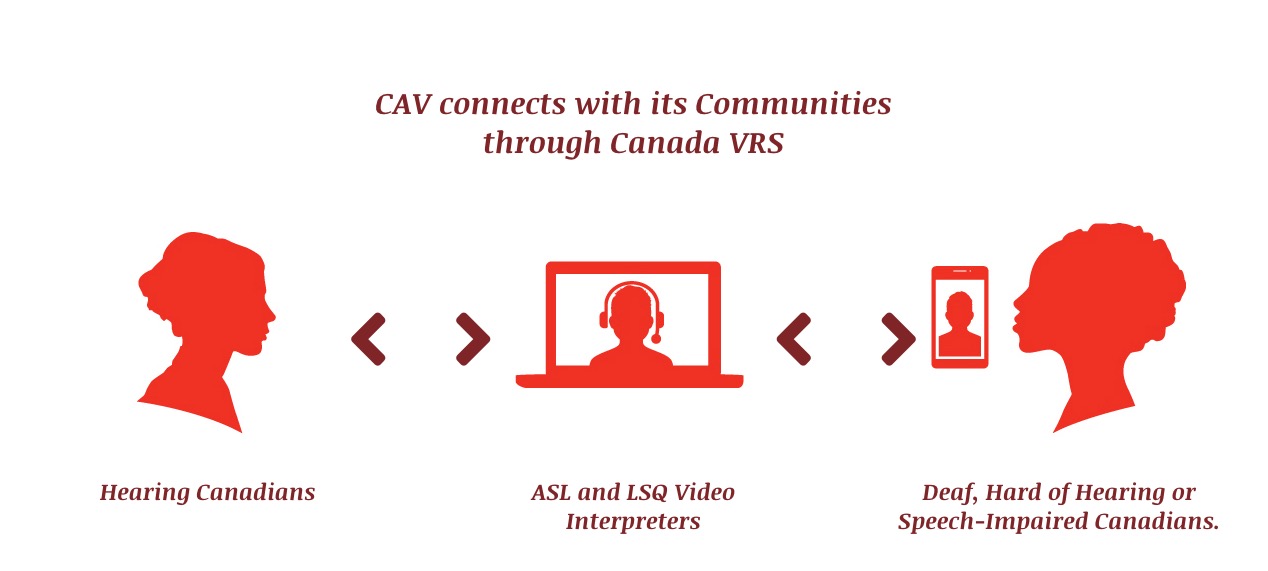EDITOR’S NOTE: As Deaf Vee Journal is expanding coverage of Canada, we are looking for Deaf Canadians who can volunteer in translating from English to Français, and also are fluent in signing ASL and LSQ. Please contact us at media@deafvee.org if you are interested. We will update here when the translated Français/LSQ version is ready, with a separate link. Thank you / Merci.
Deaf Canadians are outraged after reading a public intervention Taedra Harris, the Vice President of the Canadian Association of Sign Language Interpreters [CASLI], submitted to the Canadian Radio-television and Telecommunications Commission [CRTC] on behalf of the agency as of June 30, 2021.
Background Information
Last year, the CRTC had the Sage Research Corporation conduct qualitative research with focus groups of registered Canadian VRS users on their views and experiences, the results of which are detailed in the Sage Report. (Read the Sage Report in English via HTML here or PDF here. The Sage Report summary is also available in English via PDF here or HTML here.)
As of March this year, the CRTC published a call for comments in a comprehensive review of the video relay services being provided, with the original deadline for interventions being June 9, 2021 (read the CRTC’s Telecom Notice of Consultation 2021-102). The CRTC’s announced review of the VRS industry is available in ASL here.
The deadline was extended to July 5, 2021 for intervention submissions (read the first Telecom Notice revision here), and since then it has been suspended until further notice (read the second Telecom Notice revision here).
Key Points in CASLI’s Intervention
With over 850 interpreter members, CASLI’s filed intervention is quite lengthy with several areas for improvement.
What stands out, however, is the allegations that Canada VRS providers, which are under the oversight of the Canadian Administrator of Video Relay Service, Inc. [CAV], are recording Deaf and hard of hearing VRS consumers’ calls without their knowledge or informed consent. On the Privacy Policy section of the CAV website, CAV makes the following statement:
“CAV makes recordings of Call Record Details, such as time, duration, completion status, source number, and destination number. CAV does not make any audio or video recordings of the contents of the VRS calls and will not be collecting any Personal Information Customers may reveal in conversation during a VRS call.”
CAV’s Privacy Policy is in direct contradiction with the intervention filed, which states that “managers and staff have the right to look back at the video call for ‘quality and purposes’ or even to clarify the complaint.” How is this happening?
CASLI argues that Deaf VRS users are NOT informed before each call that the contents of their call are being recorded for quality purposes, which is causing Deaf VRS users to no longer trust the interpreters. The CAV User Agreement is not available in American Sign Language [ASL] or in Langue des Signes du Québec [LSQ], CASLI points out, which means that Deaf VRS users who do not have adequate reading skills in English or French would not have full comprehension of the User Agreement they are signing.
It’s a catch-22: Deaf consumers who cannot understand the User Agreement would have to call CAV for signed explanations of the User Agreement, but they are not able to make any calls until after they have already signed the User Agreement itself.
Another ethical concern is, Deaf VRS users are not being given a choice in whether the contents of their calls are being recorded or not. This situation indicates that Deaf VRS users are forced to compromise their privacy just to get their basic accessibility needs met for calls.
Among other actions, CASLI is calling on the CAV to add signed and text reminders for VRS users on their screen that their calls are being recorded for quality assurance purposes (even if the VRS users already signed the User Agreement contract). CASLI’s filed intervention includes feedback on the VRS system from their own interpreter members and VRS users.
Follow Up
Deaf Vee Journal is contacting the CAV, the CASLI, Canadian VRS providers, and other stakeholders for their input. A follow-up article is forthcoming.
To view CASLI’s filed intervention in English and our ASL translation, go here.






